PNND Update 19
October-November 2007
1. Five Women Leaders elected as Co-Presidents of PNND
On October 12, five leading women parliamentarians from the global north and south were elected to be the inaugural Co-Presidents of the Parliamentarians for Nuclear Non-proliferation and Disarmament. Alexa McDonough (Canada), Marian Hobbs (Aotearoa-New Zealand) LEE Mikyung (South Korea), Uta Zapf (Germany) and Senator Abacca Anjain Madisson (Marshall Islands) will lead this emerging force of 500 legislators from over 70 countries in global parliamentary initiatives to prevent nuclear proliferation and advance nuclear disarmament.
 |
|
PNND Co-Presidents Alexa McDonough and Marian Hobbs speaking at the United Nations |
|
Each of the women has demonstrated considerable leadership in their own countries and internationally.
Hon. Marian Hobbs has held the positions of Minister for Disarmament and Arms Control, Minister for the Environment, Minister Responsible for Overseas Development Aid, Minister for Broadcasting and Associate Minister for Education. She has been active internationally in the Commission on Sustainable Development, United Nations General Assembly (Disarmament and International Security Committee), Conference on Disarmament and other bodies. She has also been active in the adoption and implementation of New Zealand’s pioneering anti-nuclear legislation.
Senator Abacca Anjain Madisson is from Rongelap – an atoll in the Pacific which had to be abandoned due to radioactive fallout from nuclear testing. She has led the efforts of the Marshall Islands to receive compensation from the United States for the loss of land, environmental destruction and health problems in the islands resulting from the tests.
Alexa McDonough was the first woman leader of the Canadian New Democratic Party and is currently the New Democratic Party Critic for International Development, International Cooperation and Peace Advocacy. She has also been a leader in numerous national and international social action groups and human rights organizations.
Uta Zapf is the Chair of the Bundestag (German Parliament) Sub-Committee on Disarmament Arms Control and Nonproliferation, and is the Deputy Spokeswoman for Foreign Policy of the Social Democrats in the Bundestag. She has been a leader internationally on non-proliferation issues, including on a new parliamentarians’ initiative to ensure that nuclear technology assistance to countries is conditional on their integration into non-proliferation and disarmament measures and mechanisms. This initiative applies in the first instance to the US-India nuclear deal.
LEE Mikyung is a leading figure in the South Korean National Assembly and in North East Asia advancing cross-party and regional initiatives to advance denuclearization in the region including the Six Party process and proposals for a North-East Asian Nuclear Weapon Free Zone.
The Co-Presidents replace Senator Emeritus Douglas Roche, who founded PNND and served as its interim Chair until now. PNND thanks Senator Roche for his leadership and in bringing PNND to this new stage of its growth and development.
2. US Supermodel Christie Brinkley joins PNND Co-Presidents at the United Nations
On October 11, US Supermodel Christie Brinkley joined PNND Co-Presidents Marian Hobbs and Alexa McDonough and leading peace advocate Cora Weiss at the United Nations for a powerful all-women’s panel on "Amplifying the Moral Mission of the United Nations: Parliamentarians, Diplomats and Engaged Citizens Working To Abolish Nuclear Weapons."
 |
|
Christie Brinkley speaks at the United Nations in New York on the need to abolish nuclear weapons |
|
Extra TV filmed the event and aired excerpts during prime time US TV on October 12. A short clip is accessible at http://extratv.warnerbros.com/. Fox News, the International Herald Tribune, the Associated Press and many other major media outlets also covered the event. (Click here for a full listing of media reports.)
Brinkley, who was most quoted in the media, said "it has become abundantly clear" that the 2003 US-led war against Iraq was unnecessary because U.N. weapons inspectors has effectively shut down Iraq's weapons programs. The "good news about this failed approach," she said, is that former US Cabinet ministers including Henry Kissinger, George Schultz and William Perry have said the United States "must reinvigorate efforts to obtain a nuclear weapons-free world." I agree strongly with this conclusion.”
For photos and additional information see http://www.gsinstitute.org/gsi/archives/000303.html
3. Preventing Nuclear Genocide – PNND address by Senator Roméo Dallaire, former Commander of the UN Forces in Rwanda
On October 12, PNND hosted a special luncheon in New York in honour of Senator Roméo Dallaire’s appointment as PNND Special Representative, with the mandate to publicise the human rights and humanitarian imperative for nuclear abolition and promote cross-party action for its achievement.
Senator Dallaire’s address, Preventing Nuclear Genocide, delivered by Kim Kroeber, highlighted the “serious and immediate threat which faces each and every one of us today. Of course I am speaking about the 26,000 nuclear weapons, thousands of which are ready to launch in under 30 minutes.”
| |
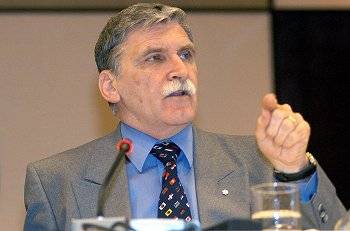 |
| |
PNND Special Representative Senator Romeo Dallaire |
Dallaire lamented that: “Most people think the subject matter is beyond their comprehension and control. This is, after all, the domain of nuclear physics and rocket science. The truth is that the basic underlying moral issue is quite straight forward and understandable by all. We must strip down the technical language and make the foundational issue clear to all.”
“Nuclear weapons are inherently evil. They are designed to attain a single goal: to cause the most massive annihilation of innocent civilians possible. They are the ultimate tool of genocide. They have no place in a truly civilized world which values life and human rights. They must be abolished.”
For the full speech see Preventing Nuclear Genocide
4. Parliamentarians advance new initiative to stand-down nuclear forces
On August 30, New Zealand Minister for Disarmament and PNND member Phil Goff launched a new international initiative calling for a stand-down of all nuclear forces and announcing that New Zealand would introduce a United Nations General Assembly resolution on the issue.
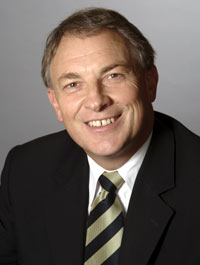 |
|
Hon Phil Goff, New Zealand Minister for Disarmament |
|
Goff noted that “Thousands of nuclear weapons currently are on high-alert status, ready for instant launch. This presents a major threat to global security. Nuclear weapon systems at a high level of readiness increase the risk of these weapons being used, including unintentionally or by accident. Such an eventuality would have catastrophic consequences.”
On October 17, New Zealand was joined by Chile, Nigeria, Sweden and Switzerland in introducing the draft United Nations resolution entitled “Decreasing the Operational Readiness of Nuclear Weapons Systems.” The resolution welcomes steps already taken by some countries to reduce the operational status of nuclear weapons, and calls for further practical steps with a view to ensuring that all nuclear weapons are removed from high alert status.
The initiative caught the attention of the United States and led to a statement by Christina Rocca, the US Ambassador to the UN in Geneva that “the US forces are not, and never have been, on hair-trigger alert… In order to comply with this request we would have to first put our forces on hair-trigger alert so that we could then de-alert them.”
| |
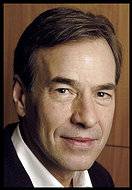 |
|
Dr. Bruce Blair |
However, Bruce Blair, former Minuteman ICBM launch control officer and support officer for the Strategic Air Command’s Airborne Command Post and Director of the Centre for Defense Information, replied that “Both the United States and Russia today maintain about one-third of their total strategic arsenals on launch-ready alert. Hundreds of missiles armed with thousands of nuclear warheads – the equivalent of about 100,000 Hiroshima bombs -- can be launched within a very few minutes.”
“Their command and early warning systems are geared to launch on warning – firing friendly forces en masse before the anticipated arrival of incoming enemy missiles with flight times of 12-30 minutes. The Presidents of both countries would come under enormous pressure to make quick launch decisions in the event of an apparent missile strike by the other side. Much of this decision process has been designed to be quasi-automatic. It can reasonably be described as going to war by checklist, enacting a prepared script, with little margin for human error or technical malfunction.”
See Rebuttal of the US Statement on the Alert Status of US Nuclear Forces, Bruce Blair, October 13, 2007
On October 19, 2007 PNND Co-Presidents Marian Hobbs and Alexa McDonough circulated a letter to all PNND members urging them to contact their foreign ministers and United Nations ambassadors to support the draft resolution when it comes to a vote sometime between October 29 and November 2.
5. Scottish Parliament opposes UK plans to replace its Trident nuclear weapons system
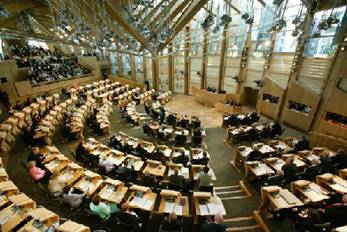 |
|
Scottish Parliament |
|
On June 14, the Scottish Parliament adopted (by 71 votes to 16, with 39 abstentions) a resolution rejecting Trident replacement and thus the indefinite extension of UK’s nuclear capability.
Whilst the Scottish Parliament does not have authority over the UK government on this issue, the resolution is significant because the UK bases its Trident nuclear submarine fleet in the Scottish port of Faslane, and stores additional nuclear weapons in Coulport – also in Scotland.
In October, the Rt Hon Alex Salmond MSP, First Minister of Scotland, sent a letter to the Ambassadors of UK-based embassies of States Parties to the NPT, informing them of “the Scottish Government's views and determination to play as constructive a part as possible in pursuing [our country’s] nuclear disarmament obligations under the NPT.” Minister Salmond also announced Scotland’s intention to “explore the possibility of taking up observer status at future NPT meetings,” in order to “more directly and effectively represent the aspirations and interests of Scotland's people.”
6. Nuclear disarmament and the US presidential candidates
For perhaps the first time since the end of the Cold War, nuclear non-proliferation and disarmament has become a major issue in the US presidential campaign. Democrat and Republican contenders are constructing and expressing a variety of positions on the wisdom of the Iraq war – ostensibly undertaken to deal with a threat from Iraq’s (no-longer-existent) weapons of mass destruction – on approaches to dealing with Iran’s developing nuclear capability, and on how far the US should go for nuclear disarmament.
On the Democratic side, Dennis Kucinich, the most avidly anti-nuclear hopeful, has called for a global treaty to abolish nuclear weapons, has introduced a bill supporting this call, co-sponsored a bill disavowing the preventive use of force as a counter-proliferation measure, and sponsored related acts on prevention of an arms race in outer space and on the establishment of a Department for Peace.
John Edwards, at a campaign speech at the Council on Foreign Relations in June, publicly supported the proposal made by Kissinger, Schultz, Nunn and Perry that the US exert leadership in establishing a nuclear-weapons-free world. Edwards stated that “I would want to associate myself with the concepts that are conveyed by Kissinger, Sam Nunn and others in the op-ed piece. I thought it was very thoughtful. And I think essentially what they said … was that we should aspire to a nuclear-free world. I agree with that.” (See John Edwards Abolitionist, The Nation). At the Iowa Presidential Debate on August 19, Edwards affirmed that as President he would “lead an international effort to eliminate nuclear weapons.” (See video clip of Edwards on nuclear abolition)
Barak Obama affirmed the goal of a nuclear weapons free world in a speech in Chicago on October 2. Obama said that “Here's what I'll say as President: America seeks a world in which there are no nuclear weapons” and that “the best way to keep America safe is not to threaten terrorists with nuclear weapons - it's to keep nuclear weapons and nuclear materials away from terrorists.”
Obama recently co-introduced with Chuck Hagel a senate bill which would strengthen measures against terrorist access to nuclear weapons and fissile materials, support the efforts of the International Atomic Energy Agency (IAEA) and establish an international fuels bank to prevent the development of proliferation-sensitive facilities in new countries. Obama has also stated that nuclear weapons should not be used in any way that could impact on civilians – and that he cannot envisage a use that would not affect civilians.
Senator Hillary Clinton, widely perceived as the front-runner for nomination has recently indicated she will preside over some cuts in nuclear arsenals. However she qualified this by stating those will not be very deep in order to not provide an ‘incentive’ for other states to attempt to match nuclear arsenals. Clinton also refused to rule out the possible use of nuclear weapons in the war on terror, specifically against alleged Al-Qaeda training camps in Pakistan. “"I don't believe that any president should make any blanket statements with respect to the use or non-use of nuclear weapons."
On the Republican side the presidential contenders are generally more supportive of the possible threat or use of force against Iran and less supportive of nuclear disarmament measures. On October 16 both Rudy Giuliani and John McCain said they would be prepared as president to use military force against Iran to prevent it from getting nuclear weapons. (See Giuliani, McCain Say Iran Won't Get Nukes). Texas Congressman Ron Paul is the only Republican candidate who opposed the war against Iraq, and is also opposed to the use of force, including any use of nuclear weapons, against Iran.
7. US-India nuclear technology deal update
PNND members around the world have endorsed a joint letter expressing concern about the US-India nuclear technology agreement which would allow the US to engage in trade with India in nuclear materials to support the Indian civil nuclear power program.
There are concerns that the deal might provide indirect assistance to India’s nuclear weapons program and undermine the Non-Proliferation Treaty by providing nuclear technology assistance to a country which is not a Party to the treaty; thus removing a key incentive for States to remain in the NPT.
The nuclear technology deal has been cleared by the US Congress, but still faces difficulties in the Indian parliament, and will need to be presented to the Nuclear Suppliers Group – an informal group of 45 countries established to provide nuclear export guidelines in order to prevent nuclear weapons proliferation. Ironically, the NSG was established at the initiative of the United States when nuclear energy assistance to India in the early 1970s enabled India to construct and test a nuclear device.
The deal appears to be opening the floodgate to nuclear technology assistance from other countries to India and to other countries not party to the NPT. On August 16, the India Times reported that the Australian cabinet had agreed to abandon Australia’s policy of not selling uranium to non-NPT countries, and was now prepared to sell uranium to India. It was also reported that France would move to operationalise a pre-existing nuclear arrangement with India.
On 25 September George Jahn reported in the Associated Press that Israel – another non-party to the NPT - is looking to a US-India nuclear deal to expand its own ties to suppliers, quietly lobbying for an exemption to non-proliferation rules so it can legally import atomic material (See Israel seeks exemption from atomic rules).
Pakistan sought a similar nuclear assistance deal with the US. When it was turned down, Pakistan turned to China for a deal to assist in the construction of six new nuclear power facilities (See Snubbed by US, Pakistan Doing Nuclear Deal With China).
PNND members in Nuclear Supplier Group countries have been active in raising key concerns about the deal. On 14 June 2007, the Upper House of the Japanese Parliament (Diet) debated the US-India nuclear deal at the instigation of Tadashi Inuzuka, a Democratic Party (opposition) member from Nagasaki.
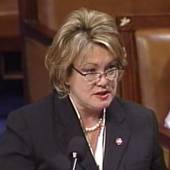 |
|
US Congresswoman Ellen Tauscher |
|
In the Netherlands, Krista van Velzen asked a number of questions in parliament which were answered by the Minister of Foreign Affairs Verhagen on 27 August. (url to come).
US Congress members opposed to the deal have not given up the fight to stop it moving ahead, turning their attention to the Nuclear Suppliers Group. On October 4, Ellen Tauscher (Chair of the House Subcommittee on Strategic Weapons), Ed Markey (Chair of the Bipartisan Taskforce on Nonproliferation) and Sam Farr (Member of the House Appropriations Committee) sent a letter to the NSG foreign ministers asking that their acceptance of the US-India deal should be contingent on entry-into-force of the Comprehensive Test Ban Treaty and a Fissile Materials Cut-Off Treaty. This would ensure that nuclear cooperation with India would not be able to assist their nuclear weapons program.
8. Model Nuclear Weapons Convention – NPT, United Nations and parliaments
In May 2007 the States Parties to the Non-Proliferation Treaty met for the first of three preparatory meetings for the next NPT Review in 2010. The government of Costa Rica used the opportunity to submit to all States Parties the revised Model Nuclear Weapons Convention, a draft treaty outlining the legal, technical and political elements to achieve a nuclear weapons free world.
The Model NWC, and the book Securing our Survival: The Case for a
| |
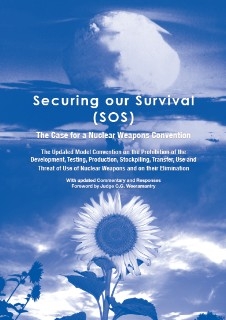 |
| |
Securing our Survival |
Nuclear Weapons Convention, have subsequently been launched in a number of parliaments around the world including Australia, Canada and New Zealand. These launches have resulted in support for a NWC from political leaders across the political spectrum including from conservative former Prime Ministers Malcolm Fraser (Australia) and Jim Bolger (New Zealand), Nobel Peace Laureates, UN officials, military leaders, parliamentarians and civil society.
Costa Rica and Malaysia have invited other countries to join them in submitting the Model NWC to the United Nations General Assembly this October-November. On Oct 20, PNND Co-Presidents Marian Hobbs and Alexa McDonough circulated a letter to all PNND members urging them to contact their foreign ministers and United Nations ambassadors to encourage them to join this initiative.
9. PNND Global Council Meeting October 12
PNND held its Global Council Meeting in New York on Oct 12. The meeting:
- Appointed the PNND Global Council for 2007-2008
- Elected five Co-Presidents for PNND
- Welcomed Senator Roméo Dallaire as PNND Special Representative
- Agreed to change the name of the network to Parliamentarians for Nuclear Non-proliferation and Disarmament
- Discussed key nuclear nonproliferation and disarmament issues
- Discussed PNND activities for the next 2-3 years including outreach, conferences and parliamentary actions on issues
Name change:
The PNND Global Council decided at its meeting to endorse the proposal to change the name of the network from Parliamentary Network for Nuclear Disarmament to Parliamentarians for Nuclear Nonproliferation and Disarmament. The proposal, which was circulated to all PNND Members in July, was made in order to eliminate a misconception from some key countries that ‘disarmament’ refers only to unilateral disarmament measures and does not include the wider range of nonproliferation and multilateral disarmament measures (see attached memo). It will take some time for the PNND secretariat to operationalise the name change, i.e. to update stationery, documents, promotional materials and the website. We plan to complete the transition by January 1, 2008. In the meantime, PNND members are welcome to use either name for the network.
PNND Council and Annual Meetings:
The PNND Council affirmed at its meeting that PNND has reached the stage of its development in which more regular meetings – both actual and virtual - are possible and would be useful to enhance collaboration and effectiveness of international parliamentary actions and initiatives. PNND is in consultation with Pugwash in order to arrange annual PNND conferences at the Thinkers Lodge in Nova Scotia with support from Pugwash Peace Exchange. In addition, the PNND secretariat will be arranging regular PNND Global Council conference calls and a number of issue oriented international video conferences over the next three years.
10. Summary of PNND activities and accomplishments
For new PNND members, or for PNND members wishing to introduce the network to other parliamentarians, we recommend our summary of PNND activities and accomplishments. This includes on overview of our activities from our modest beginnings in 2000 to our much more robust organization today.
11. Legislators and the United Nations Disarmament Agenda – Oct 26, New York
PNND, the Parliamentary Forum on Small Arms and Light Weapons and Mayors for Peace co-hosted this event. Legislators met with United Nations officials and representative of key countries to discuss ways legislators can support the UN disarmament agenda focusing on small arms and nuclear weapons.
Speakers included: António E. Évora (UN Office for Disarmament Affairs), Knut Langeland (Foreign Ministry of Norway), Carlos Vargas Pizzaro (Former Legal Consultant to the government of Costa Rica), Randy Rydell (UN Office for Disarmament Affairs), H.E. Don Mackay (Ambassador of New Zealand to the United Nations), Jackie Cabasso (Mayors for Peace) and legislators from around the world.
Click here for more information.
12. Parliamentary Hearing at the United Nations: Reinforcing the Rule of Law in International Relations: The Key Role of Parliaments. November 21-27
This seminal event, hosted by the Inter-Parliamentary Union will include key experts, legislators and policy makers including PNND Council Member and international lawyer Jonathan Granoff, Srgjan Kerim (President of the UN General Assembly), Ban Ki-Moon (United Nations Secretary-General), Maria Teresa Fernandez de la Vega (Deputy Prime Minister of Spain), Senator Rosario Green Macias (Chair of the Mexican Senate Foreign Affairs Committee), Fatou Bensouda (Deputy Prosecutor for the International Criminal Court), Yukio Takasu (Chairman of the UN Peace-Building Commission), and others. The hearings will include a special session on nuclear nonproliferation and disarmament. Click here for more information.
|


